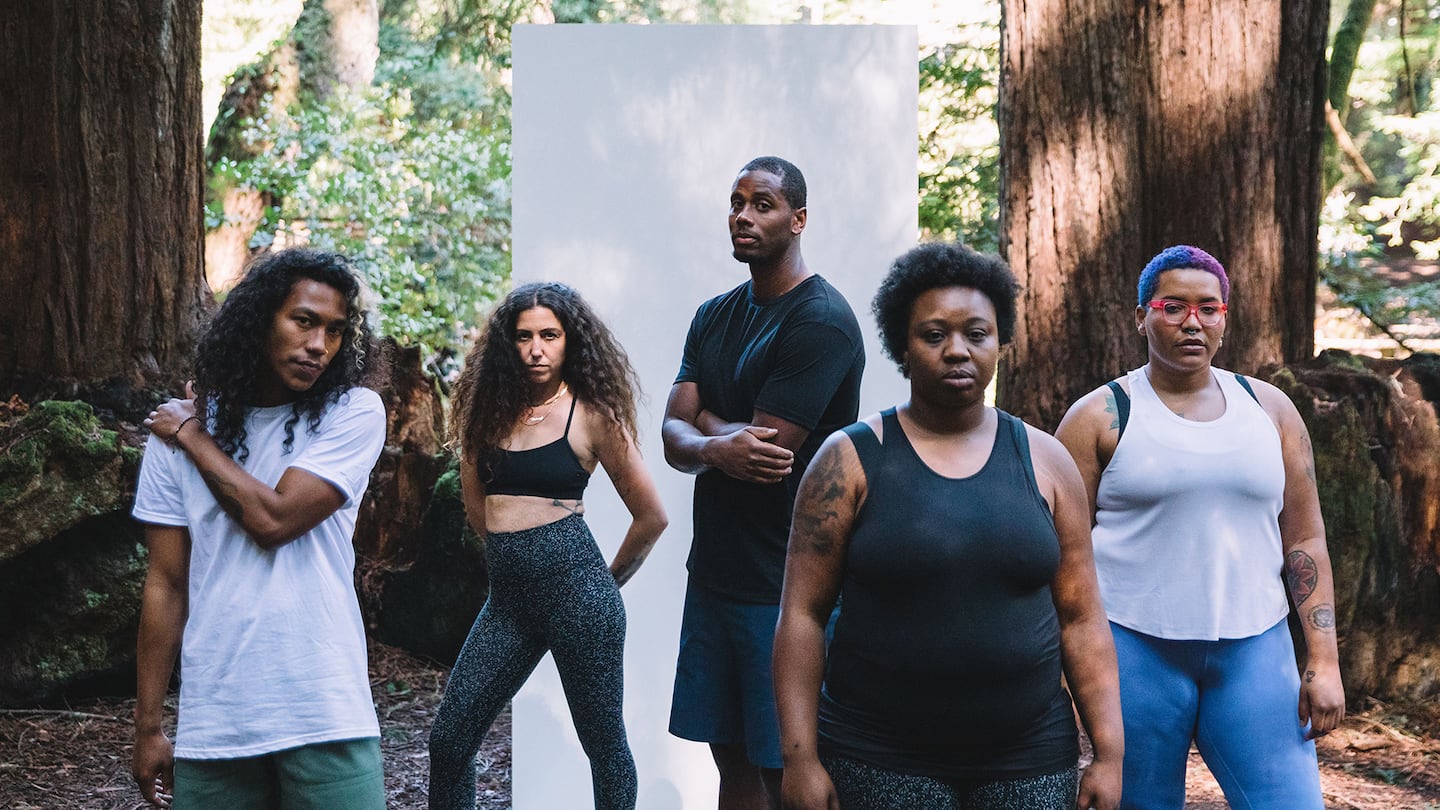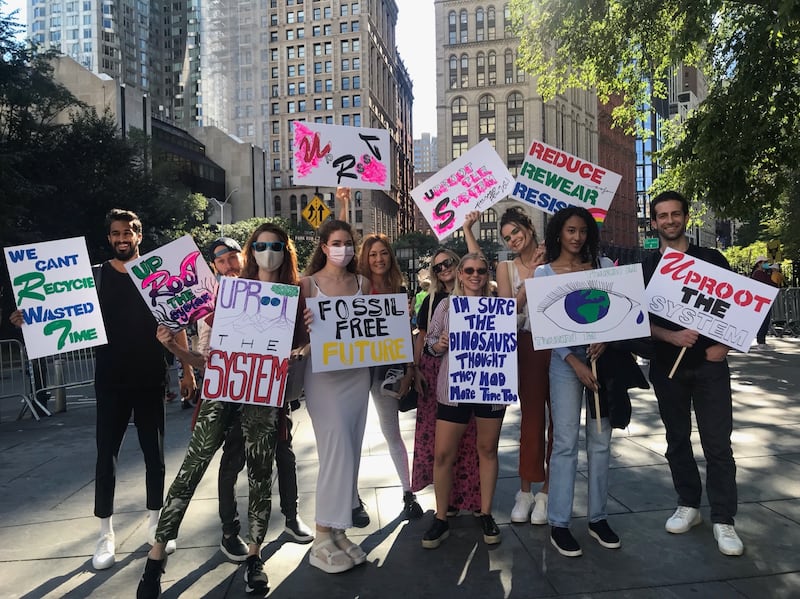
The Business of Fashion
Agenda-setting intelligence, analysis and advice for the global fashion community.

Agenda-setting intelligence, analysis and advice for the global fashion community.

Claire Barker, a 29-year-old school administrator at the University of East Anglia in England’s Norwich, used to be the type of shopper who only bought clothes that were made from recycled fabrics and manufactured in countries with transparent labour laws.
But after reading a report about online shopping’s effects on the environment, she recently pledged to buy as little as possible.
“I used to think, ‘I really like this dress, what are the materials and was it made ethically?’ and now I’m thinking, ‘do I really even need this enough to contribute more to the energy of shipping?’” Barker said.
With global warming on everyone’s mind, the number of shoppers who are as anxious as Barker about climate change is growing, and they see fashion as a major contributor to the problem. Plenty of Gen-Z customers still shop for fast fashion, but many young shoppers are also involved in climate activism and are eager to see change.
ADVERTISEMENT
As world leaders gather in Glasgow this week for the United Nations Climate Change Conference, plenty of consumers are also deciding which fashion brands are truly sustainable enough to shop. For brands, this means reaching customers whose fears about climate change are driving their spending habits. This subset of consumers are a different group from sustainably-minded shoppers. They are instinctively sceptical of brands’ sustainability pledges and see secondhand marketplaces and recycled materials as table stakes to earn their loyalty — if they can be convinced to shop at all.
“People my age are fully aware of the impact shopping is having on the environment, and we are going to stores less,” said Lucy Gott, an 18-year-old climate activist and high school student from Northern California.
We want to see brands stopping with the massive amounts of product and thinking about how they can change their business model.
Climate-conscious shoppers say they’re more open to spending with brands that take concrete action to prove they care about sustainability, such as end of life care and in-house recycling programmes. They are also more likely to trust brands that share details about their supply chain, and are open to admitting where they’ve gone wrong. Most of all, shoppers want to see brands demonstrate a willingness to sacrifice sales to save the planet.
“We want to see brands stopping with the massive amounts of product and thinking about how they can change their business model,” said Martina Sorghi, a London-based member of global environmental group Extinction Rebellion.
Putting Secondhand First
While plenty of big fashion brands are getting into resale, sustainability experts say shoppers want these efforts to be more than a side project.
“We’re seeing more secondhand and circularity programmes, but most brands are not converting them into their business plans in a meaningful way,” said Rachel Arthur, a London-based sustainable fashion consultant. “The sustainable choices should be the default choice.”
Brands could make the switch by promoting their used products on their homepage, first thing, Arthur suggested.
ADVERTISEMENT
Open the Hood
Shoppers concerned about climate change are hungry for knowledge and are more likely to trust brands that share information about materials and supply chain.
“I want to see information on the website about where the materials are sourced, where it’s produced, and if a company doesn’t share this, it’s an automatic bad sign for me,” said Johanna Buchmann, a Berlin-based environmental activist.
Customers are more knowledgeable than ever, so we wanted to make sure we went as over the top as we could.
Tenere, an activewear start-up that uses recycled materials, maps out details of how its products are made, from where the recycled raw materials are collected to where the yarn is knitted and dyed. It also lists the factories it uses, along with the workers’ hours, wages and benefits.
“Customers are more knowledgeable than ever, so we wanted to make sure we went as over the top as we could in order to provide them information about our supply chain,” said Tenere co-founder Brian Koegel.
Sharing such information could leave a brand open to criticism, but many shoppers will also appreciate the transparency.
However, brands should resist the temptation to brag about their sustainability efforts, Sorghi and Arthur both agreed.
“Don’t try and advertise that you are doing something better because you aren’t; you are doing something that is necessary,” said Sorghi.
ADVERTISEMENT
Koegel of Tenere took the approach of sharing with shoppers some of the brand’s shortcomings, like the fact that it’s still using some synthetic fibre in its activewear.
“We say ‘we’re not a completely sustainable brand, here are areas that we need improvement,’” Koegel said. “We overexpose ourselves by sharing information so shoppers can ask us questions and we can engage with them.”
Take Responsibility
Sustainably-minded shoppers like Marissa Rosenblum, a former buyer for Barneys who now works in content marketing and has swapped shopping for renting, said she’s more likely to trust brands that take on the responsibility of recycling.
“Things have to change, but... it has to come from the industry, not from us shoppers,” Rosenblum said.
This was one way Thousand Fell found it could differentiate itself in the crowded sustainable footwear category. Thousand Fell asks shoppers to send back their shoes after they’re done with them so the brand can recycle them into new shoes.
“[Circularity] really needs to be brand-driven,” said Stuart Ahlum, co-founder of Thousand Fell. “For us, it’s about changing the [narrative], that it’s not the consumer’s problem.”
For Days, a fashion brand that makes clothes out of recycled materials also has a buy-back programme where it incentivises shoppers to recycle by giving them shopping credit. For Days also recycles other brands’ clothing. Caylor said it was important to show customers it’s committed to solving the waste problem, regardless of whether they’re shopping with For Days.
Shoppers are thinking about the resale potential, and just not contributing to the landfill, and they want brands to help them.
“We want shoppers… thinking of us as the solution,” said chief executive Kristy Caylor. “I think the attitude of doing this arm in arm works in our favour.”
Shoppers like Barker also respect brands that offer in-house repairs. It signals that brands are committed to helping the shopper keep the product for longer than a few seasons.
“It shifts the psychology in general, away from that disposable mindset to investing into taking care of a product,” said Kathrine Nasteva, a sustainable fashion consultant. “Shoppers are thinking about the resale potential, and just not contributing to the landfill, and they want brands to help them.”
Get Involved
As more people are getting involved in climate activism, there is an expectation that brands join them, said Nancy Metzger-Carter, a sustainability and climate educator at Sonoma Academy, a private high school in Northern California.
Activists have long been impressed with Patagonia’s track record in fighting for the environment, including a lawsuit filed against the Trump administration to protect federal lands from development.
Brands like Eileen Fisher, Mara Hoffman and Reformation recently signalled their support for President Joe Biden’s spending plan, which includes funding to reduce emissions.
“Fashion has a platform, it’s an industry that has influence and could help move policy, because a lot is not going to change unless the laws do,” said Sorghi.
Some brands have taken activism to a more local level. Thousand Fell invites customers to attend clean-ups, climate strikes and has also organised digital events for customers to learn about topics like textile waste.

“We wanted to be able to engage with our core audience beyond ‘hey, buy these sneakers,’” said Ahlum. “Activism felt like the natural next step.”
Slow Down
Climate-anxious shoppers want to see the cycle of consumption slow down, which for brands means fewer sales. Geraldine Wharry, a fashion futurist and trend forecaster, said brands should be looking for ways beyond physical products to make money.
“They can segue into media, blockchain, NFTs, digital skins,” she said. “Fashion marketing is feeling older and older, which is why you’re seeing more luxury brands do interesting things to reach people in a different way.”
Activists like Buchmann say they’d be more inclined to shop with brands that promote a slower cycle.
“Society needs to accept that you buy two trousers a year, not 20, and fashion brands have a lot of power to spread this message because they have audiences,” Buchmann said.
Related Articles:
Making Fashion’s Marketing Machine Sustainable
As they move to protect their intellectual property, big brands are coming into conflict with a growing class of up-and-coming designers working with refashioned designer gear.
The industry needs to ditch its reliance on fossil-fuel-based materials like polyester in order to meet climate targets, according to a new report from Textile Exchange.
Cotton linked to environmental and human rights abuses in Brazil is leaking into the supply chains of major fashion brands, a new investigation has found, prompting Zara-owner Inditex to send a scathing rebuke to the industry’s biggest sustainable cotton certifier.
Over the last few years, the run-up to Earth Day has become a marketing frenzy. But a crackdown on greenwashing may be changing the way brands approach their communications strategies.